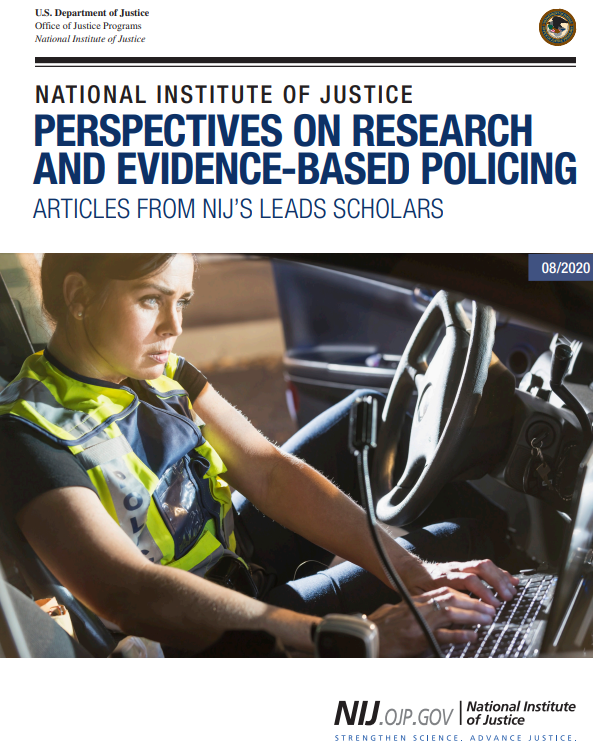Research-minded law enforcement officers often perform some level of management analysis, whether through in-house evaluations driven by data analytics, compliance analysis, or iterations of performance monitoring. Thoroughly planned and well-implemented research, based on an agency’s specific needs and run by strong managers, not only adds to the evidence about what works for the agency but also augments experience with facts. When law enforcement officers take active roles in police science and scientific inquiry, they add to the evidence base of good policing practices and increase buy-in from their peers. This is important because the effectiveness of a program or policy might vary based on jurisdiction or circumstance.[1] Different agencies police different communities, each with unique perceptions of law enforcement shaped by culture, geography, and experience. The implementation of evidence-based research projects will improve policing by providing answers to what works and delivering actionable results to agencies.
Evidence-based policing research is the practice of gathering information about the effectiveness of a policing program, practice, or policy initiative by using established scientific methods. It involves examining whether an intervention is having the intended effect, and whether that effect is observable by others and is based on facts.[2] Integrating evidence-based programs and policies into police practice is now an expectation in criminal justice operations. Law enforcement leaders have been called on to support an expansion of policing research that evaluates the effectiveness of their policing strategies.[3] Police agencies therefore need a range of approaches to assess new policies, test long-standing practices, and set the best course for change.[4] It is not enough to merely implement an evidence-based program or policy. Evaluation of the intervention is necessary to determine whether desired outcomes are being produced and how those outcomes affect the agency, officers, and communities. The results of one evidence-based analysis might justify actionable change in policy or suggest a best practice for an agency. However, this practice might not produce the same desired outcomes when implemented elsewhere. When multiple agencies seek to replicate findings by testing and evaluating these strategies locally, they inform their own evidence-based practice.[5]
Conducting evidence-based research can be complex, but the effort is worth the reward. Results provide support for good policies and insights on how to improve bad ones. Long-term commitment, multifaceted protocols, and broad collaboration with internal and external colleagues may be a deterrent for some, but the long-term effects are worth the expenditure of resources. Research outcomes help improve the way we deploy our officers, manage our agencies, and engage with the community.
For those who are new to evidence-based research, the prospect can seem challenging. However, most of us have already engaged in this process without recognizing it. When we ask questions about why a protocol is working (or not) and how to test it, we are engaging in evidence-based practice. The leap from conducting informal evidence-based research to officially implementing sound research requires more planning. Guidelines for implementing rigorous evidence-based research and navigating its challenges are found in the basic tenets of project management. Leveraging on-the-ground personnel in this process supports the project management framework in a way that can preserve the integrity of the research. Not only can these operational personnel manage research projects, they can help police leaders identify and establish research partnerships that will support such endeavors. Police leaders can leverage these officers’ informal networks to initiate trainings or discussions, with the aim of identifying researchers who are best suited to supporting the goals of their agencies.[6]
Other points to note are that although good research is a collective effort, a strong leader with in-depth knowledge of the research agenda is essential for keeping a project on track and ensuring that the overarching goals and milestones are met. As with every other part of policing, communication and adherence to protocol are key to ensuring that a research project progresses smoothly. Regular data collection and analysis are also necessary. Constant monitoring helps uncover issues that could delay timelines, negatively affect outcomes, or discredit results.[7] Identifying and managing these risks early on keeps the research on the right course and could even prevent a study from becoming overly compromised, which would result in its termination. These basic principles of research can help any new evidence-based practitioner start exploring questions pertinent to his or her agency.
For those already engaged in evidence-based research, there is always room for improvement. Improving the way we use evidence-based research in the planning and implementation phases will lead to better outcomes and save agencies time, effort, and resources in supporting these endeavors. In fact, the planning stage is the most critical phase of implementing evidence-based research and practice. Good planning produces stronger research and limits waste — a major concern for short-staffed and underfunded agencies that want to optimize their performance through research.
Collaboration is also key to good research. In all parts of the process — planning, execution, and monitoring — the participation of external subject matter experts and officers with experience in research and data analysis improves the quality of the final product. This is especially important in smaller agencies where it may seem impractical to manage large and intricate projects. Engaging subject matter experts early on will ease communication lines throughout the life of the project and provide support to officers normally focused on other priorities. In this way, we ensure that research standards are met so that stakeholders will have confidence in the outcomes.[8]
An example of one such collaboration is Iowa State Patrol’s partnership with the Center for Evidence-Based Crime Policy at George Mason University. Together, they are planning a quasi-experimental evaluation of a multiyear project aimed at reducing traffic crashes, injuries, and fatalities.[9] Notably, the intervention utilizes a deployment strategy previously shown to effectively control crime.[10] In this way, Iowa State Patrol has taken an established best practice and sought to test it locally, thereby building its own evidence base. Integral to this partnership is the area commander, whose participation in all stages of the project framework grounds the research in an operational context.
The many nuances of putting research designs into practice can be navigated and monitored by operational personnel. This role is integral to research partnerships and can mitigate issues that have the potential to compromise results. Using data-driven approaches to assess agency operations, adequately communicate and translate research requirements, and explain why those requirements are important all aid in preventing corruption of the research design and producing a project that rigorously evaluates what it is intended to measure.
Conducting evidence-based research inside an agency legitimizes the decision-making process both internally and for the broader community.[11] However, the quality of the research and results must be high because they provide justification for action and change. Good management optimizes the research process, produces reliable conclusions, and ultimately increases stakeholder satisfaction. Good management comes from engaged law enforcement personnel who take ownership and lead efforts to improve the way their agencies function. They understand that continuous growth requires continuous assessment. They know that when we test ourselves, we can see our weaknesses with greater clarity and improve upon them. Choosing to go beyond assumption and anecdotes, to explore the effects of our practices, and to seek out the answers to important questions shows that we are committed to continuous improvement that benefits our own officers and the communities we serve.



